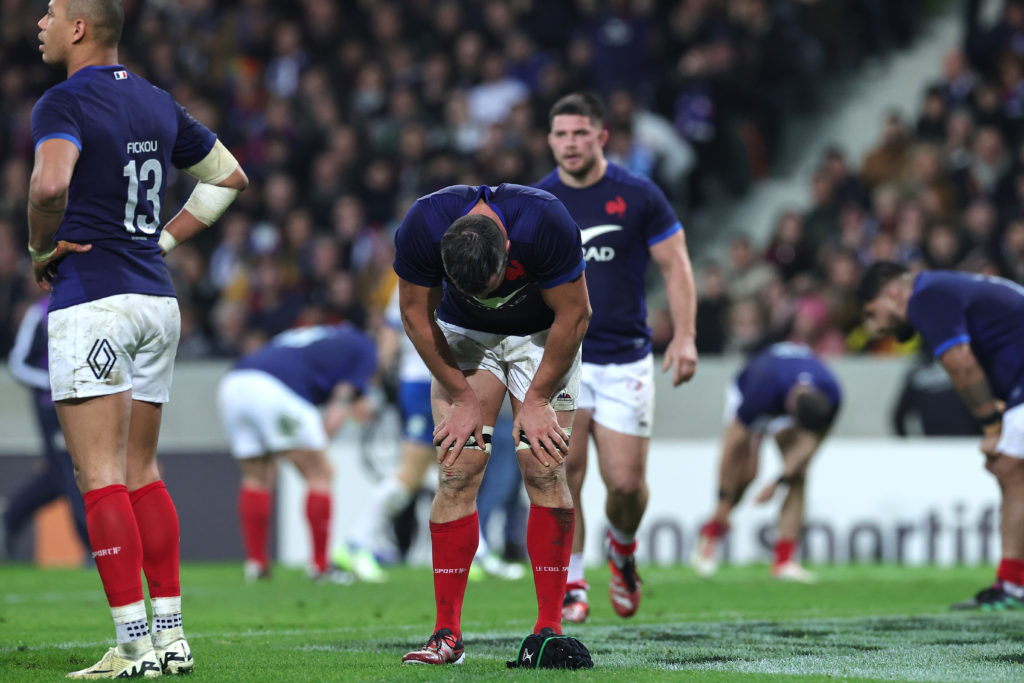Ever since France’s agonising defeat to the Springboks in the World Cup quarter-final, Les Bleus’ head coach Fabien Galthie and his players vowed to come to terms with the loss and move on.
However, in the four months since that one-point loss to the eventual champions, with many having tipped France to lift the Webb Ellis trophy for the first time, the French still appear haunted by the ghosts of that heartbreaking exit.
Sunday’s 13-13 Six Nations draw with Italy came after the temporary boost of a win over Scotland.
That victory had followed a home humbling to Ireland, who have shown how to deal with their own quarter-final loss — to New Zealand — and are on course for a historic second Six Nations Grand Slam in a row.
Galthie took over after the 2019 World Cup by reacting to years of underperforming with an all-conquering style, sweeping aside the likes of New Zealand and South Africa and also lifting the 2022 Six Nations.
That positivity has all but disappeared and Galthie’s attempt at breathing fresh air into his team by changing the coaching staff has yet to bear fruit.
“It feels massive, comparing where were in the past to where we are now, it’s not that big of a thing, but at our level it’s a lot on paper, the quality of the performance,” Galthie said.
“We will put a lot of energy into this moment of painful resilience,” the 54-year-old added.
Galthie’s ability to get over the Springboks loss has been hampered by the absence of regular skipper Antoine Dupont, away with France’s Sevens team before the Paris Olympics.
Dupont, the injured Anthony Jelonch and Thibaud Flament were all present at the Stade de France last autumn.
Regular first-choice flyhalf Romain Ntamack continues to suffer from the knee injury that ruled him out of the World Cup.
Former France captain Galthie’s decision to stick with ageing scrumhalf Maxime Lucu as Dupont’s stand-in, instead of starting with the more energetic 21-year-old Nolann Le Garrec, has been the main focus of criticism.
“If you see the team lineup compared to the quarter-final, it’s changed a bit,” Galthie said.
“Our way of working is firstly a vision with consistency,” Galthie added.
Next up for Galthie’s men is March 10’s trip to a youthful Wales, who are still finding their feet in Warren Gatland’s second spell in charge.
“We have to find a new energy to be succesful again and be a France that win games again,” winger Matthis Lebel said.
“Something has to come from inside us players, it can’t only come from Fabien Galthie.
“It’s a new four-year cycle but before throwing everyone under the bus, you have to be cautious with your words,” he added with the 2027 World Cup already on his mind.
Italy had to deal with their own World Cup disappointment, shipping 181 points and 25 tries across four matches as they were knocked out in the pool stages before ex-Argentina flyhalf Gonzalo Quesada took over from New Zealander Kieran Crowley.
Signs of progress in just three games under Quesada have been obvious, with backs like fly-half Paolo Garbisi, winger Tommaso Menoncello and full-back Ange Capuozzo the poster boys for the Azzurri’s future.
On Sunday, only a last-gasp penalty miss by Paolo Garbisi denied them a famous victory.
Italy next host Scotland on March 9, with Quesada’s side eyeing a first home Six Nations win since 2013.
“I’m very happy for the boys, from the inside the squad are serious, they have an incredible motivation to work,” Capuozzo said after Italy avoided defeat against France for the first time in more than a decade.
“We have also have a very young team. We have very few players aged 30 or over.
“To have a reward like that is important for what’s to come,” he added.
© Agence France-Presse
Photo: David Rogers/Getty Images





